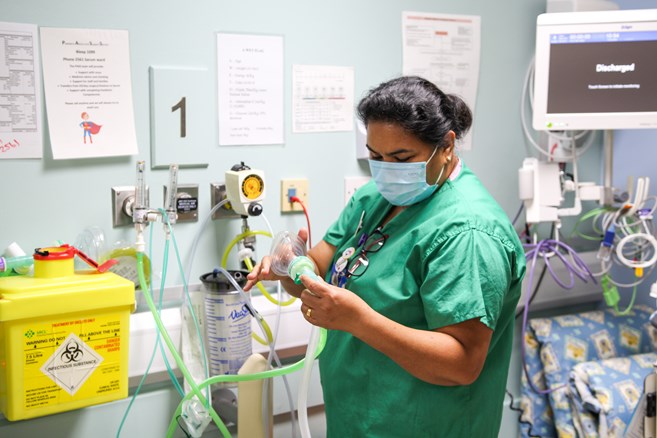

Medicines account for about 25% of emissions within the NHS in England. A small number of medicines account for a substantial proportion of these emissions, particularly anaesthetic gases and nitrous oxide which account for around 2% of NHS emissions, and inhalers which account for around 3%.
The NHS is working with patients, clinicians and industry to reduce emissions by reducing waste, ensuring that the right medicines are available for patients and enabling shared, informed decision making.
 Medicines and gases at SFT
Medicines and gases at SFTThrough our Medical Gas Committee we have ceased using Desflurane, a medical gas responsible for a significant amount of carbon emissions, replacing it with Sevoflurane.
We have made progress on recycling foil packaging/blister strips, with collections in place to ensure products are recycled.
We need to focus on ways in which the use of Nitrous Oxide can be reduced. Nitrous Oxide is a major component of Entonox and whilst a very effective analgesic for labouring women, Entonox is a greenhouse gas that accounts for over 2% of the NHS carbon footprint (Sulbaek et al, 2012; Sustainable Development Unit, 2013).
Many inhalers used within the Trust are aerosol based and as such, release carbon emissions. Alternatives to current commonly used inhalers may be more expensive and not as effective. Our Pharmacy team are working closely with healthcare colleagues in Primary Care to achieve the transition to more environmentally friendly products.
There is significant wastage of Medicines that could otherwise be avoided; our Pharmacy team are working to reduce this.

Our staff at Salisbury District Hospital have long been well regarded for the quality of care and treatment they provide for our patients and for their innovation, commitment and professionalism. This has been recognised in a wide range of achievements and it is reflected in our award of NHS Foundation Trust status. This is afforded to hospitals that provide the highest standards of care.
